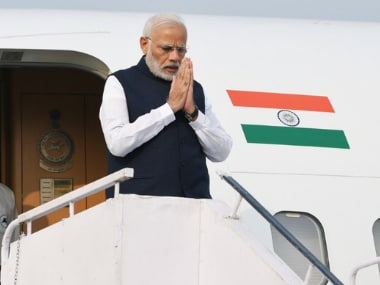Let’s start with some numbers. India has jumped 65 spots in World Bank Ease of Doing Business (EoDB) rankings in last four years, among which a 53-rung leap came in the last two. This may qualify as the biggest-ever jump by a large country in such a small time period. This jump was driven by an improvement in 8 out of 10 business indicators measured by the World Bank. In nine parameters, India has moved closer to global best practices. At a granular level, to give just one example, 21 regulatory changes have been brought in for startups in the last two-and-a-half years. [caption id=“attachment_5566131” align=“alignleft” width=“380”]  File image of Prime Minister Narendra Modi. Image courtesy PIBTwitter/@PIB_India[/caption] Why is better EoDB ranking — that almost sounds too elite — important for a nation that still has the ‘emerging-economy’ tag and is fighting to put in place the building blocks of human development and pull millions out of poverty? In the words of Jim Yong Kim, World Bank Group president, “These might seem like mundane, bureaucratic rules, but the reality is that the ease of doing business matters a great deal – for economic growth, future prosperity, and helping people lift themselves out of poverty. We publish the rankings every year to get the attention of heads of state and ministers of finance and make the findings hard to ignore.” But Modi is evidently not satisfied with India’s current rank of 77 and is resolved to catapult India among the top-50 in EoDB. He also wants to make India a $5 trillion economy in the “shortest possible time”. To achieve these targets and also to deliver on the next stage of reforms, the prime minister on Monday announced the launch of the Ease of Doing Business Grand Challenge.
In a meeting at his Lok Kalyan Marg residence on Monday evening with captains of industry and policymakers, where Firstpost was also invited, Modi sought for innovative ideas based on Artificial Intelligence, Internet of Things, Big Data Analytics, Blockchain and other cutting-edge technology to reform government processes.
Among other aims, the ‘grand challenge’ may serve as the conduit for out-of-the-box thinking and throw up ideas to implement technology-driven governance. The aim, according to the prime minister, is to minimise the human intervention. Startup India portal will be the platform for the initiative. “Our aim is not only to improve ease of doing business but to also improve the ease of living for every Indian,” said Modi during his speech at the event, casting the rankings as the means to achieve the end Apart from doing away with needless regulatory mechanisms, that also involves working closely with states. Towards that end, the prime minister vowed to strengthen “cooperative, competitive federalism” and claimed that the Centre is coordinating with the states in streamlining regulatory mechanisms and expediting clearances. To initiate reforms at a granular level the focus must be on districts, said the prime minister. He added that consultations with all stakeholders, including states, are on to determine how to implement these at the district level. There might be a ranking of districts, for instance, to foster healthy competition. The meeting, organised by the Department of Industrial Policy and Promotion, was also attended by the prime minister’s cabinet colleagues Arun Jaitley, Suresh Prabhu, Harsh Vardhan and Hardeep Singh Puri, apart from industrialists such as Anand Mahindra, Harsh Neotia, Balkrishan Goenka, Rakesh Mittal, Vijay Shekhar Sharma among others. The presence of business leaders at the meeting is interesting. It points to Modi’s conviction that industry (udyog) is of seminal importance if India is to achieve growth, create jobs, increase per capita income and break into the top-50. It also indicates that the prime minister is unafraid of being seen with entrepreneurs at a time when the toxic political discourse has painted all big businesses black. The holding of the meeting at prime minister’s residence was also not without significance. It was aimed at showcasing the level of importance he attaches to the reforms process. Modi’s stress on regulatory reforms such as the Goods and Services Tax or the Insolvency and Bankruptcy Code (IBC) is notable. As the World Bank Group president says, “an entrepreneur can get electricity connection in half the time and through half as many procedures as in 2014, and now it costs less than 30% of per capita income.” It now easier and faster to get a passport or construction permit. His passion for taking India ‘faster and higher’ on the reforms highway by constantly setting newer and tougher targets is praiseworthy. However, these targets must be tested on the altar of realism. Amid the hype over India’s rise, it must also be noted that India’s ranking has actually slipped two notches in “paying taxes” parameter despite the implementation of the GST and shed five spots “resolving insolvency” despite the IBC. Modi wants to crack the top-50, but India may find it difficult to do so in light of the World Bank adding a new parameter to assess the ranking from next year. Called “contracting with the government”, this indicator will “assess contracting public procurement system of the governments around the world”. This move is not the only incumbent on close coordination between the Centre and states, it may also put tacit pressure on India to open up its government procurement system to foreign bidders. Here, the Centre is likely to run into a political landmine. While Modi has pitched India frequently as the prime destination for foreign investors, these political hurdles won’t be easy to cross. Cracking top-50 is tougher than it sounds.


)

)
)
)
)
)
)
)
)



